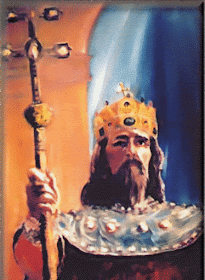King Saint Stephen converted all of Hungary to Catholicism, he ended idolatry and false religions and defeated all his anti-Catholic opponents.
St. Stephen, King of Hungary by Father Francis Xavier Weninger, 1876
When Stephen had arrived at manhood, and had taken the reins of government, he resolved most earnestly, to exterminate all idolatry among his people, and everywhere to plant the emblem of the Christians, the Cross. To be more secure in his pious undertaking, he formed an alliance with the neighboring princes in order to prevent them from assisting those of his subjects who might oppose his design. Notwithstanding this, some of the Hungarian nobility dared to take up arms in defense of idolatry, and to make war against their legitimate Lord. St. Stephen, full of trust in the Almighty, met the rebels with his small force and defeated them so completely, that in future none ever dared refuse him obedience. The great and rich booty of which St. Stephen became possessed on this occasion, he appropriated to the building of a Monastery in honor of St. Martin, a native of Hungary. The Saint then invited from different Catholic lands, priests and religious men to Hungary to instruct the people.
Those who were converted were favored with many privileges and immunities by the devout prince, while the refractory were dealt with in such a manner, that they were prevented from opposing others in embracing Christianity. In various cities and villages he erected Churches and Chapels, endowing them all richly. The number of the faithful grew in a short time so much, that he divided Hungary into ten dioceses, to all of which he endeavored to give holy bishops. He sent a certain bishop Anastasius to Rome, to request the Pope to confirm all he had done for the propagation of the Christian faith, and also to beg the holy Father to proclaim him King, so that he would be invested with greater power, happily to conclude the conversion of the entire country. During the night on which Anastasius arrived at Rome, an Angel informed the Pope of St. Stephen's request, and commanded him to give to the Saint's ambassador the crown which he had designed for another prince. Inexpressibly rejoiced at everything that Anastasius related to him, the Pope confirmed what St. Stephen had done to disseminate the faith of Christ, and granted him the privilege to act further as he and his bishops thought the welfare of the Church demanded. He also sent him the crown and a cross of gold which should be carried before him after the coronation.
Saint Stephen King pray for us.
When Stephen had arrived at manhood, and had taken the reins of government, he resolved most earnestly, to exterminate all idolatry among his people, and everywhere to plant the emblem of the Christians, the Cross. To be more secure in his pious undertaking, he formed an alliance with the neighboring princes in order to prevent them from assisting those of his subjects who might oppose his design. Notwithstanding this, some of the Hungarian nobility dared to take up arms in defense of idolatry, and to make war against their legitimate Lord. St. Stephen, full of trust in the Almighty, met the rebels with his small force and defeated them so completely, that in future none ever dared refuse him obedience. The great and rich booty of which St. Stephen became possessed on this occasion, he appropriated to the building of a Monastery in honor of St. Martin, a native of Hungary. The Saint then invited from different Catholic lands, priests and religious men to Hungary to instruct the people.
Those who were converted were favored with many privileges and immunities by the devout prince, while the refractory were dealt with in such a manner, that they were prevented from opposing others in embracing Christianity. In various cities and villages he erected Churches and Chapels, endowing them all richly. The number of the faithful grew in a short time so much, that he divided Hungary into ten dioceses, to all of which he endeavored to give holy bishops. He sent a certain bishop Anastasius to Rome, to request the Pope to confirm all he had done for the propagation of the Christian faith, and also to beg the holy Father to proclaim him King, so that he would be invested with greater power, happily to conclude the conversion of the entire country. During the night on which Anastasius arrived at Rome, an Angel informed the Pope of St. Stephen's request, and commanded him to give to the Saint's ambassador the crown which he had designed for another prince. Inexpressibly rejoiced at everything that Anastasius related to him, the Pope confirmed what St. Stephen had done to disseminate the faith of Christ, and granted him the privilege to act further as he and his bishops thought the welfare of the Church demanded. He also sent him the crown and a cross of gold which should be carried before him after the coronation.
Saint Stephen King pray for us.






Thank you for this excellent write up.
ReplyDelete